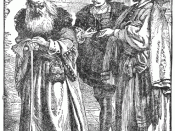The merchant in 'The Merchant of Venice', by William Shakespeare, there appears Shylock. As the play unfolds Shylock is seen to be the villain. He is portrayed as being cold, unbending, and evil. But is he? Is Shylock really the antagonist in this play or can he also be viewed as a persecuted individual who resorts to revenge only after he has been pushed too far. To fully understand the character of Shylock we must first look at Elizabethan attitudes towards Jews. The earliest documented presences of Jews were recorded in Oxford, during the year 1075. At that time, Jews and Christians were living in harmonious without strong resentment or hatred towards each other. Despite this, there were certain rules that Jews had to abide such as they were banned from certain trades and professions as they were not considered citizens. In the sixteenth century Jews were rarely if ever seen in England.
In the Middle Ages Jews had fled to England to escape persecution in France under the Normans. They were granted charter in England by Henry I in return for a percentage of their profits from trade and money lending. It is here that the stereotype of Jews lending money was started which spurred on to the representation of Jews as a greedy community.
A few years before 'The Merchant of Venice' was written, an accusation was made towards Queen Elizabeth's physician of attempting to poison her. His public execution and the fact that he was of Jewish background led to an outbreak of anti Semitism in the country. Similarly in today's world, after the incident that took place on September 11th 2001, many have been vigilant towards the Middle Eastern races for fears for repercussions. Many other plays were written during Shakespearean...


